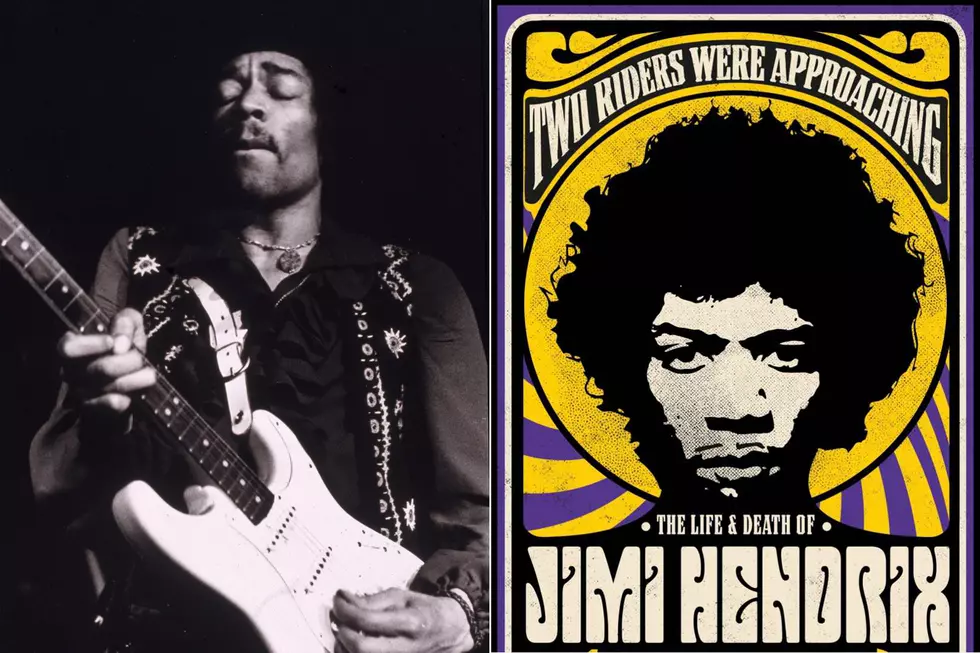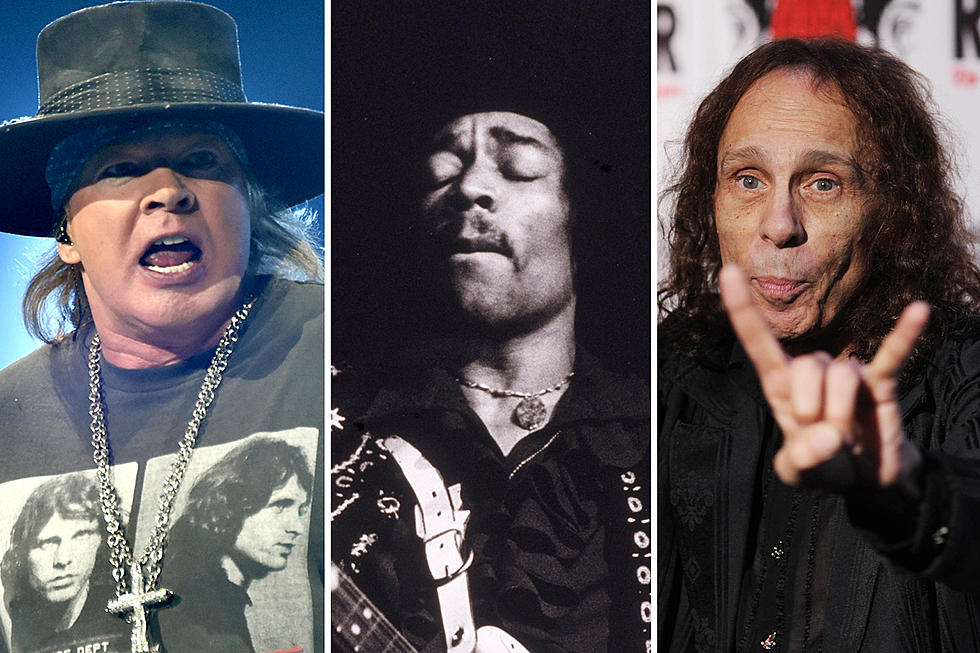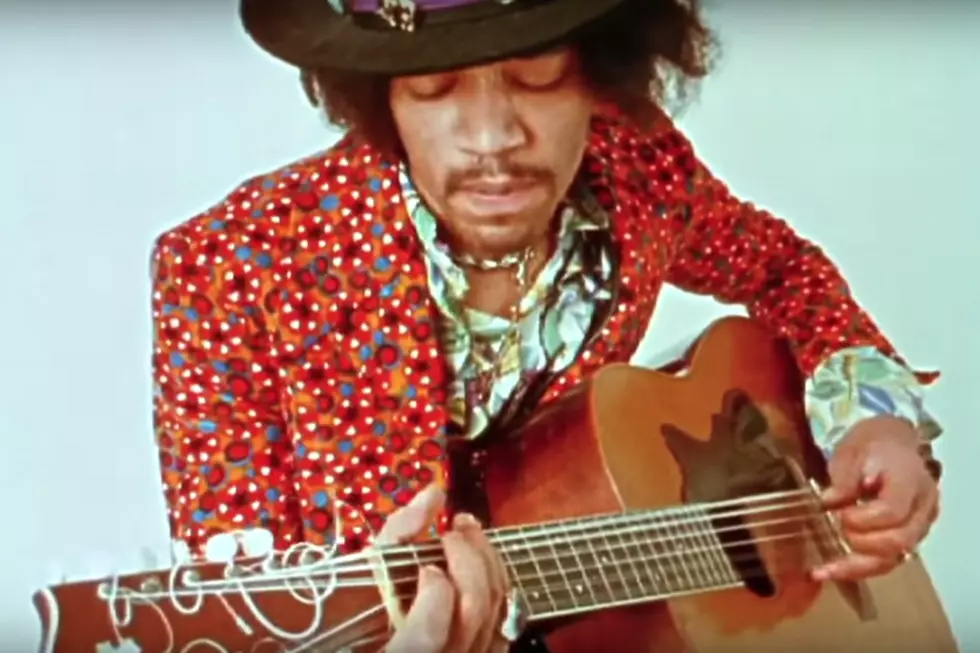
When Jimi Hendrix Started His Own Band: Book Excerpt
The life and times of legendary guitarist Jimi Hendrix are chronicled in the new book Two Riders Were Approaching: The Life & Death of Jimi Hendrix.
Author Mick Wall did extensive research and explored an array of interviews while assembling this story of the iconic rocker. Tales of music, drugs and groupies are presented against the backdrop of the '60s, a tumultuous era reflected by social unrest and the Vietnam War.
In the excerpt below, we find Hendrix - then still going by “Jimmy” - in the early stages of his career; an exceptional talent still trying to blaze his trail in the world of music.
It was while Jimmy was still hung up working for bupkes for the Squires, playing second fiddle to Curtis Knight with his cookie cutter songs and half-assed vocals, knowing he was now the real attraction, ready to start his own thing, but unable to do so while he didn’t have his own guitar, just the one Curtis had ‘loaned’ him. Going in ever-decreasing circles in clubs like The Purple Onion and Ondine’s on the Upper East Side, dancehall joints that only really jumped when they saw Jimmy biting his guitar and swinging it around his back like Fred doggie-fucking Ginger.
Even picking up another gig – second banana guitarist in sax player King Curtis’s band the Kingpins – brought nothing but a few extra dollars. The Kingpins was one of the tightest bands on the circuit and Jimmy had to work his ass off to keep his spot. But he was back to wearing a band uniform and doing unison moves. Cheesy as fuck shit he thought he’d left behind. You couldn’t even take your jacket off unless the King took his off first and he almost never took his jacket off first. Jiving around playing second lick to ‘Stand By Me’ and ‘Yakety Yak’.
Bullshit gigs. Then crawling back to his cheap hotel and putting Rubber Soul on the portable record player, aching to the bitter truth of Lennon’s ‘In My Life’ and seeing his own past and future shrinking to the head of a pin. Not a kingpin either, a tack. Worse, laying Coltrane’s Ascension on the deck and feeling like no one told him when to run. That it was already all over for him.
He changed his name again – Jimmy James – and finally started his own group. Going for broke with the Village hipsters, he called it The Rainflowers. The rain fucking what, Jim? Quickly realised his mistake and renamed it the Blue Flames, after Little Junior Parker’s band in the fifties – as in: ‘Ladies and gentlemen, please welcome to the stage the one and only Jimmy James and the Blue Flames!’
Cue: roof-raising applause.
That’s how he sold himself to Carol/Kim anyway. But at first she wasn’t buying it. ‘I thought he was on an ego trip.’ He was. But that had been offstage, at some friend-of-a-friend’s pad. When they met again after a Curtis gig at a new club on Broadway and 53rd called Cheetah that opened in May, it was a different scene. The Cheetah was all sub-Warhol popping-lights bouncing off shiny aluminium. Fake cheetah print walls, a long bar down one side. A big deal for five minutes, Jimmy came offstage and made straight for the white chick that had blown him off before. Now she’d seen him play the new happening joint… right?
He swaggered over to her table, went down on one knee and began whispering in her ear, some bullshit about wanting to kiss her knee.
‘So of course I laughed. I mean how many people tell you they wanna kiss your knee? Three days later we moved in together. It was like an instant fire kind of thing.’
Living together at the Lenox hotel, having a white chick support him gave Jimmy a lift, helped him feel like he was still moving forward somehow. It didn’t matter that Carol was another prostitute, she wasn’t a street hooker like Diana, she was a high-class call girl, had taste, and a way about her. Carol would cook Jimmy his favourite breakfast – spaghetti and garlic, fuck eggs – would help him put his curlers in at night and do his hair, wouldn’t make a scene on those nights he didn’t come back to the hotel. Carol was there those nights he returned from another gig with Curtis ready to blow his top, moaning how Curtis had ripped him off again for the money he’d been promised, how Curtis played bullshit songs that embarrassed him.
Carol didn’t get it: why didn’t he just quit then?
‘Because it’s his guitar.’
Carol got so tired of hearing about it she went out one day and bought him a white Fender Stratocaster. Jimmy nearly lost his mind! Now he had his own guitar he could do what he wanted! Two nights later, playing with Curtis again, Jimmy unplugged his guitar and announced, ‘That’s the last time I play this shit.’
Jimmy James and the Blue Flames couldn’t get booked at the Gaslight where all the real blues heavies played, so they did one-offs at the Kettle Of Fish on McDougal, the Night Owl Café on West 3rd Street. Most especially, when they could get it, the Café Wha? – the basement joint under the Players Theater where the poetry and hopped-up beatnik cats held sway. You played for free in the afternoon and if they liked you they invited you back in the evening.
Jimmy told Carol he was getting forty bucks a night to play there. He was getting seven dollars. He didn’t care. The Café Wha? was the first place where he could finally start to extend his reach, doing his own versions of new-today stuff like ‘Like A Rolling Stone’, or ‘Wild Thing’, or re-jiving old shit like ‘Hey Joe’ and ‘Shotgun’.
Jimmy didn’t mind who joined him onstage. For a while he had a fifteen-year-old white runaway on guitar with him, name of Randy Wolfe. Because the bass player was also named Randy – Palmer – who Jimmy had nicknamed Randy Texas, he called the young Wolfe, who’d been born in LA, Randy California. The white kid was so good Jimmy wanted to keep him on but Randy’s parents nixed that idea once they’d tracked him down, forcing their son back to school when summer was over. Randy did okay though when he later formed his own cool-dude outfit, Spirit.
Jimmy meanwhile was getting lost trying to be all things to all people. A black guy playing white rock music: a white girlfriend who supported him but he couldn’t stop cheating on: a serious musician who spent his days reading Marvel comics and digging the new Batman show on ABC. A Dylan freak with processed hair and re-conned stage moves. He had worked his way up to six nights a week at the Café Wha?, splitting whatever he was paid each night evenly with the band. But the performances were becoming more willfully erratic.
Carol, who’d hung on in there long past the call of duty, finally bailed out.
‘He would go off. The last song would be forty-five minutes of feedback and freak everybody out… I saw him lay down on the stage and cry during a performance.’
Slowly though word was getting out about the crazy young black cat in the Village that played left-handed guitar upside down. Important people were starting to pay attention. John Hammond Jr. who’d introduced Dylan to The Band. Jimmy, he said, was ‘one of those things that just boggles your mind, I just could not believe it.’
Mike Bloomfield, the fieriest guitarist in New York, who’d also been store-bought by Dylan for 'Highway 61 Revisited.' Before he saw Jimmy James at the Café Wha?, he said, ‘I thought I was it.’ Afterwards: ‘H-bombs were going off, guided missiles were flying… I didn’t even want to pick up a guitar for the next year.’
Top 100 Albums of the '60s
More From 96.7 The Eagle









